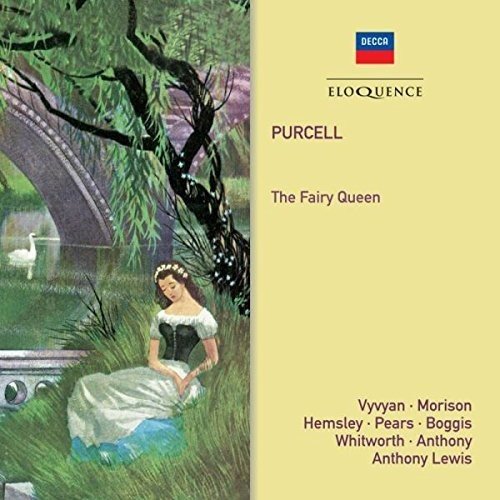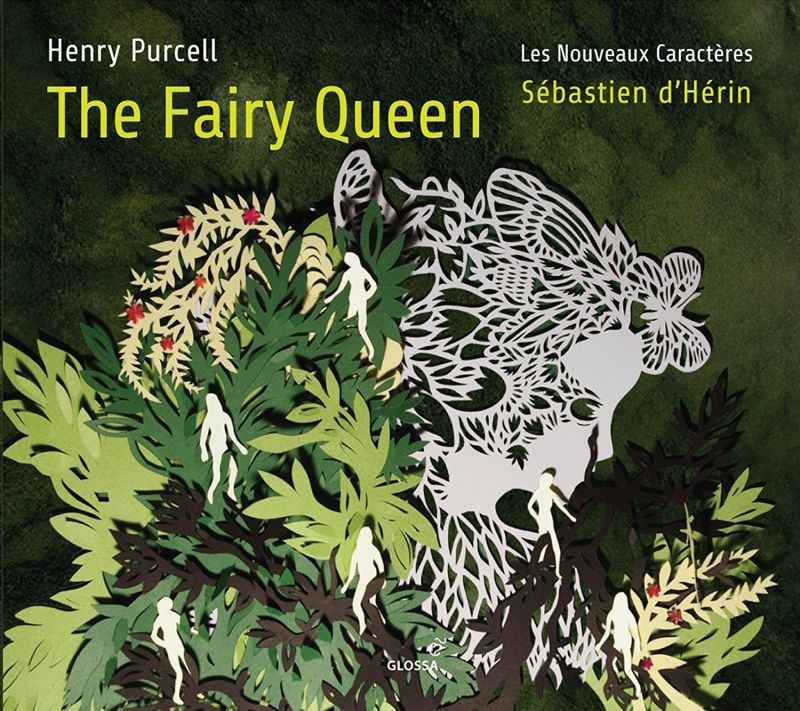PURCELL The Fairy Queen - Lewis and d’Hérin
View record and artist detailsRecord and Artist Details
Composer or Director: Henry Purcell
Genre:
Opera
Label: Eloquence
Magazine Review Date: 12/2017
Media Format: CD or Download
Media Runtime: 129
Mastering:
ADD
Catalogue Number: 482 7449

Tracks:
| Composition | Artist Credit |
|---|---|
| (The) Fairy Queen |
Henry Purcell, Composer
Anthony Lewis, Conductor Boyd Neel Orchestra Elsie Morison, Second Fairy; Night; Chinese Woman; Spring; First Woman; Juno, Soprano Henry Purcell, Composer Jennifer Vyvyan, First Fairy; Mystery; Second Woman, Soprano John Whitworth, Second Chinese Man; Secrecy; Summer, Countertenor Peter Boggis, Mopsa Peter Pears, Phoebus; Autumn; First Chinese Man, Tenor St Anthony Singers Thomas Hemsley, Drunken Poet; Coridon; Hymen, Baritone Trevor Anthony, Sleep; Winter, Opera |
Composer or Director: Henry Purcell
Genre:
Opera
Label: Glossa
Magazine Review Date: 12/2017
Media Format: CD or Download
Media Runtime: 123
Mastering:
DDD
Catalogue Number: GCD922702

Tracks:
| Composition | Artist Credit |
|---|---|
| (The) Fairy Queen |
Henry Purcell, Composer
Anders Dahlin, Tenor Caitlin Hulcup, Mezzo soprano Caroline Mutel, Soprano Christophe Baska, Countertenor Frédéric Caton, Bass Guillaume Andrieux, Baritone Henry Purcell, Composer Hjördis Thébault, Soprano Julien Picard, Tenor Kevin Greenlaw, Baritone Les Nouveaux Caractères Ronan Nédélec, Baritone Samuel Boden, Tenor Sébastien d’Hérin, Conductor Virginie Pochon, Soprano |
Author: David Vickers
Nevertheless, Lewis sketches contrasting dramatic moods and varied musical colours with nuanced imagination. Elsie Morison’s sensitive Night (with beautifully shaded muted strings) and Trevor Anthony’s icy Winter (ample harmonic richness wrung from softly sonorous strings) are spellbinding. Jennifer Vyvyan’s pealing runs in ‘Hark! The echoing air’, Morison’s profoundly moving Plaint (I assume it’s Morison, although it’s not credited in the booklet; either way the violin solo is played tenderly by Granville Jones) and Peter Pears’s floating lightness in the middle section of ‘Thus the gloomy world’ are impeccably Purcellian by any yardstick. Countertenor John Whitworth achieves a graceful balance of head and chest voice in ‘One charming night’ (Lewis’s use of flutes rather than recorders is one of the most obvious ways in which performance practices have changed). Thomas Hemsley’s Drunken Poet is an endearing favourite uncle with embarrassing literary pretensions who has clearly been at the sherry again; the fairies’ teasing pinches of him are impishly mischievous rather than cruelly sadistic. Indeed, the shifting moods of comedy, tragedy, charm and sense of spectacle are transparent throughout Lewis’s congenial performance.
A brand new recording tries to reinvent the wheel. Sébastien d’Hérin’s loquacious essay praises that Purcell’s music is ‘composed with discernment and care, great emphasis being placed on detail’, and that personalities ‘emerge by way of light brushstrokes’. However, sporadic applications of anachronistic cornett, serpent, regal, viol, harp and copious ad libitum percussion are less like light brushstrokes than broadly lathered caprices. D’Hérin claims that his ‘personal orchestration’ avoids being ‘a prisoner of that tradition which often ends up narrowing our choices’. The inference is that Purcell needs additional artificial flavourings – and yet it transpires that they seldom improve the recipe. Les Nouveaux Caractères’ playing tends to be bold and sometimes even astringent, although a lovely performance of the Rondeau is realised with sensual inégales. Sharp staccato in the scene for the Drunken Poet has sizzling energy, although briskness leaves no room for Kevin Greenlaw to convey humour. Fruity organ registration and rippling harp are disturbances during an uneven Masque of Night: Caroline Mutel’s strident ‘See, even Night herself is here’ is hindered by the strings’ forgoing discretion, whereas Anders Dahlin’s languid high tenor is matched aptly by seductive recorders and lush continuo in ‘One charming night’ – but aggressive bowing and an intrusive regal mutate the Dance for the Followers of Night into a grotesque nightmare.
The symphony in which swans come forward is so exaggerated and percussion-laden that the bevy must be monstrous and clumsy. The Masque for the Four Seasons comes off best; the clipped character of the bookend choruses is inelegant, but Guillaume Andrieux’s declamatory Phoebus and each of the four seasonal soloists are spot-on – particularly Frédéric Caton’s sinewy Winter. D’Hérin’s choices of obbligato cornett and chordal viola da gamba during the Plaint are unhelpful distractions, and unbridled vocal embellishment in ‘Hark! The echoing air’ is tasteless. On the other hand, Samuel Boden’s relaxed fluency in ‘Thus the gloomy world’ is Purcellian singing of supreme finesse. Conceived by d’Hérin as an experimental alternative, the outcome is a curate’s egg.
Discover the world's largest classical music catalogue with Presto Music.

Gramophone Digital Club
- Digital Edition
- Digital Archive
- Reviews Database
- Full website access
From £8.75 / month
Subscribe
Gramophone Full Club
- Print Edition
- Digital Edition
- Digital Archive
- Reviews Database
- Full website access
From £11.00 / month
Subscribe
If you are a library, university or other organisation that would be interested in an institutional subscription to Gramophone please click here for further information.




